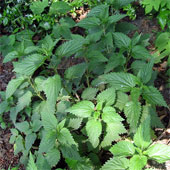November 14th, 2011 by Paul Auerbach, M.D. in Research
No Comments »


Stinging nettle plants, courtesy of Dezidor (CC BY 3.0)
Hikers often brush up against injurious plants, such as poison oak or thorny shrubs. One particularly vexing plant is the “ubiquitous weed, Urtica dioica,” commonly known as stinging nettles. As described in an article entitled “Mechanism of Action of Stinging Nettles” (Wilderness & Environmental Medicine:22,136-139,2011) by Alexander Cummings and Michael Olsen, direct contact exposure to the weed causes immediate stinging and burning sensation on the skin. The authors exposed mouse skin to the plants and looked at this skin using an electron microscope. They found smooth nettle spicules that had pierced the skin surface, a few of which retained their bases, which appeared empty of liquid contents. The authors concluded that the mechanism of action of stinging nettles skin reaction was both biochemical and mechanical, likely caused by impalement of spicules into the skin.
The spicules are present as small “hairs” that are found on the stem and undersides of the leaves of the plant. Even light touch against the plant can cause a reaction, which is often characterized as Read more »
This post, The Burning, Itching, And Swelling Of Stinging Nettles: Removing Them From The Skin, was originally published on
Healthine.com by Paul Auerbach, M.D..
November 6th, 2011 by Toni Brayer, M.D. in Health Tips
No Comments »


Immediately Post-op Carpal Tunnel release
Carpal Tunnel Syndrome (CTS) is common and is the result of the median nerve becoming squeezed or “entrapped” as it passes through the wrist down into the palm of the hand. Because this is a sensory nerve, the compression causes tingling, burning and itching numbness in the palm of the hand and fingers. A different nerve goes to the little finger and the lateral half of the 4th finger so the sensation there would feel normal. There is often a sensation of swelling even though there is rarely any true edema that can be seen in CTS.
The symptoms of Carpal Tunnel Syndrome usually start at night when people sleep with flexed wrists. As it progresses, the tingling and numbness can be felt on and off during the day. It can cause decreased grip strength and weakness in the hands.
CTS can be worsened by medical conditions like rheumatoid arthritis, diabetes, pregnancy or wrist trauma. Women are three times more likely to develop CTS than men, and it is rare in children. Most of the time no cause is found. The space that the median nerve traverses is very tiny and it doesn’t take much to compress the nerve. Even small amounts of tissue swelling such as occurs in pregnancy can cause severe symptoms.
The treatment for Carpal Tunnel Syndrome starts with Read more »
*This blog post was originally published at EverythingHealth*














